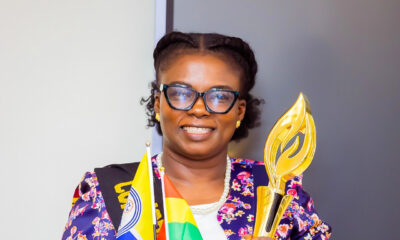Features
Queen Uwabuofu Is The Crotchet Queen, Winning Children’s Hearts With Relatable & Washable Toys
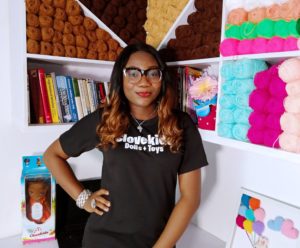
Queen Uwabuofu
When Queen Uwabuofu had her first son, she was in financial despair and could not afford clothes for her baby. Having trained and worked as a professional make-up artist and wigmaker, money was tight.
She made up her mind to learn how to crochet to keep her son warm. Uwabuofu spent days watching crochet DIYs and how-to tutorials on YouTube, practising constantly. In time, she was making clothes and posting some on her WhatsApp status. She received good reviews and soon, orders started coming in from friends and family.
That is how Clovekids International was born. Today, it is an indigenous doll-making company in Lagos, Nigeria.
“I didn’t start with making crochet dolls. At first, it was custom-made booties, caps, sweaters, and dresses for kids,” the mother of two says. “I started this business in 2017 with N400 (0.96 USD). It’s been uphill from there,” she adds.
The company ventured into making dolls after a near-fatal incident when Uwabuofu witnessed her son almost choke on a piece of a plastic toy. In that instant, Uwabuofu realised the need for eco-friendly, hypoallergenic, long-lasting, and washable toys for children. And once again, her crocheting skills came to the rescue.
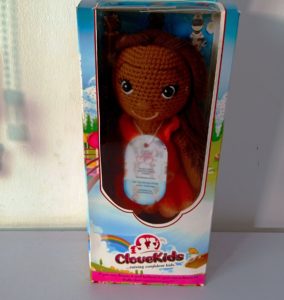
Clovekids International was started by Uwabuofu two years ago. In 2019, she added crochet dolls that cost from N25,000 ($65) and up.
Adding dolls to her line of products meant more to Uwabuofu than just the safety of toys. For this business entrepreneur, representation matters, which is why Clovekids dolls have varied tones of black skin.
With the help of a team of other crocheters in her company, she makes handmade dolls that African children can relate to. Some of the dolls have braids, afros, and patterned dresses.
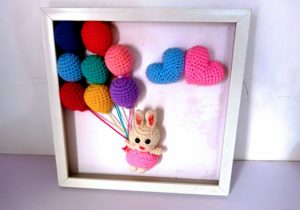
“Our dolls fascinate many people. That’s understandable because crocheted dolls, black ones at that, are unique. The reception has been great; this shows that we’re filling a gap many people didn’t know existed,” Uwabuofu explains.
The reviews on Clovekids’ website give credence to this. One customer, Chioma, is as fascinated with the dolls as she is with the packaging. “I finally took a look at the dolls, and they are nothing short of exquisite works of art. My kids would absolutely love them. They come so well packaged that I do not need to wrap them,” her review states.
The toy industry in Nigeria is at its nascent stage. There is the rise of indigenous toy companies launching their products on the market. Reportbuyer.com estimates that the toy industry will have $120 billion in revenue by 2023.
Presently, Uwabuofu ships Clovekids dolls to customers in Nigeria, Ghana, South Africa, Australia, Canada, Germany, the UK, the USA, and the UAE. She also sells them on Etsy.
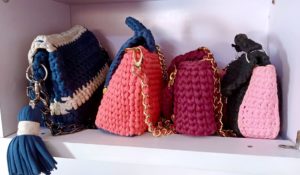
However, she plans to expand her business with outlets in Ghana, Gambia, South Africa, Tanzania, and Nigeria, where customers can buy ready-made and custom-made dolls in stores. “Usually, we ship our dolls to customers in Africa and the diaspora through our third-party logistics company. However, we’re hoping that by 2023, we will have physical stores in these countries,” Uwabuofu explains. “We also plan to have our dolls in stores and e-commerce websites in Nigeria so that distribution will be easy,” she adds optimistically.
Today, Clovekids International also runs an academy, Clovekids Academy, which offers online training to budding crocheters in over seven countries. Through the academy, Uwabuofu is creating an impact among young people after realising that many of them have dreams but lack the skills, knowledge, and resources to realize them.
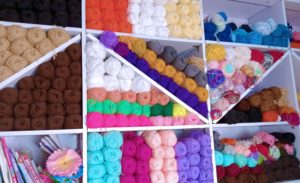
She is also mentoring some young women who have shown potential in the crochet business. Among these is 18-year-old Semilore Omobolaji. The young protégé thinks she was meant to work at Clovekids International after graduating from Clovekids Academy.
“I was lucky,” Omobolaji says. “In 2021, my goal was to get better at crocheting. Shortly after, a woman in her church approached me, telling me she would love to introduce me to her friend who runs a crochet business. It turned out to be Uwabuofu.”
“I started as a student at Clovekids Academy, the only one attending physical classes at the time because her classes were taught online,” she adds.
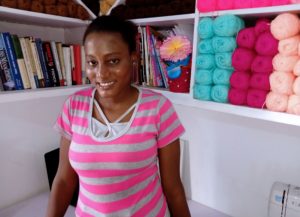
According to Omobolaji, the academy goes beyond teaching the students about the craft. It also focuses on helping them create a sustainable business afterwards.
“I currently run my own crochet business, hooked by Jiwun, while interning at Clovekids. Sometimes when I need help to figure out some parts of my business, I go to her (Uwabuofu) for advice,” Omolaji says. “I’ve been her intern for a year, and she continues to push me to be the best in business and life,“ she adds.
Blessing Eyo, the lead fashion designer at Clovekids International, is another person who regards Uwabuofu as more of a mentor than a boss. “Since I started working here two months ago, I’ve been dreaming bigger. My ambitions are broader. I create the clothes for the dolls, and I’m glad to make my designs,” Eyo says.
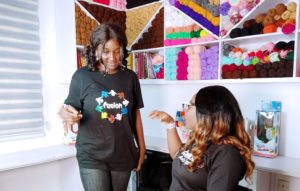
“Usually, women are looked down on as second-class citizens, but Uwabuofu has made me realise that I have opportunities to invest in and achieve,“ she adds.
Meanwhile, Uwabuofu is helping other crafters gain visibility with her recently launched YouTube series, Crafty Hands with Queen TV Show, showcasing “the craft, the crafter, and the craftwork.”
For all Uwabuofu is doing, the world is noticing.
In 2021, she won the Creative Business Cup for being the most creative entrepreneur, receiving a cash prize of N1 million ($2,404). The Creative Business Cup Nigeria worked with the Mastercard Foundation and the Enterprise Development Center of the Pan-Atlantic University to run the program.
According to the Enterprise Development Centre, Queen Uwabuofu “will represent Nigeria at the Creative Business Cup Global Event in Denmark this year.”
Photo/Story Credit: Gabriella Opara






